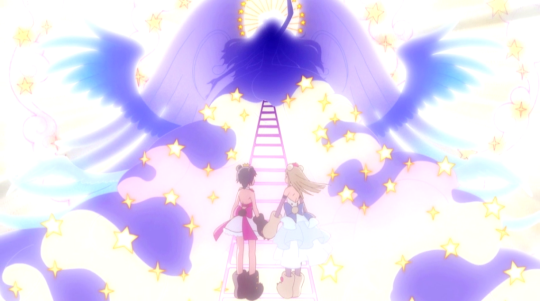The following was originally posted on Dee Hogan’s blog The Josei Next Door and has been republished with permission.
I thought I’d start this with a spoiler-free review, for those of you scrolling past and wondering if you should give this strange little series a try. Hit the jump to read on, and I’ll let you know when the spoilers kick up again.
So let’s get right to it: the Yurikuma Arashi finale was perfect. It was beautiful and hopeful and emotionally moving and thematically satisfying, and I absolutely loved it. I loved it so much it’s all I can do not to just splatter this post with reaction gifs of people squeeing and flailing their arms and applauding loudly. Loved. It.
Granted, this isn’t to say the entire series is perfect: The brisk pacing in the first half means it takes a while to develop connections with the characters, and the first few episodes have a lot of WTF-ery, especially if you don’t know where the story is going (although once you do, it does form a complete, albeit messy, picture, and I’m very much looking forward to a rewatch). I’d also have to give it content warnings for nudity/sexuality and especially for some pretty visceral representations of bullying, although it’s all done for a larger purpose.
But those are mostly episode-by-episode issues, and YKA is written more like a long film than a TV series, making it nigh impossible to judge it by its parts. And now that we have the sum of those parts, I can say without hesitation that Ikuhara did, in fact, know exactly what he was doing. In 12 short episodes he wove a powerful, moving tale of prejudice and fear and love, a story that was at once an exploration of the cultural treatment of, well, really all women, but especially lesbians (both in reality and fiction); a commentary on the gap between hateful religious zealots and the loving gods they claim to follow; a critique on the idealization of female innocence and purity; a study of bigotry and how to combat it; and half a dozen other complicated social issues and feminist topics.
And all of that is awesome, don’t get me wrong. But what really makes YKA (and its finale) shine is that, for all that great analytical stuff, it is also a beautiful, simple little love story about two people stepping out of their “boxes” and finding each other. I suspect your personal enjoyment of the series will hinge on how much you care about the characters, and for me, the answer to that ended up being: a whole heck of a lot. So, despite my early misgivings, the journey proved to be another of Ikuhara’s flawed but nevertheless brilliant works of art.
Series Grade: A. Would bear-shock again.
Or, TL;DR:
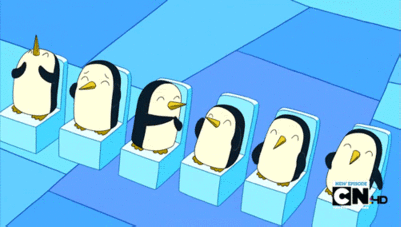
Okay. Thus endeth the review. The spoilers are in full force past this paragraph. All you YKA newbies should skedaddle. And go watch Yurikuma Arashi. Funimation has the entire thing subbed and the first three episodes dubbed (new dubbed episodes will continue to air on Tuesdays). And please, give it at least four episodes. It gets progressively better as it goes, and the pay-off is well worth the work it takes to get there.
The Recap
A Quick Note on the Subs: Funimation continues to adjust their translation on the fly (you may have noticed that “Kumalia” became “Kumaria” recently), and this week we see Lulu’s brother “Mirun” translated as “Milne.” As other viewers have already noted, the character is almost certainly named in honor of A.A. Milne, author of the Winnie-the-Pooh stories (hands-down my favorite children’s books of all time, incidentally). Just wanted to make sure everyone was aware of that.
When we last left our heroes, everything was terrible, and that’s where this one picks up. As Ginko cradles her lost friend in her arms, Lulu gets one last voice over, thanking Ginko and Kureha for their time together.
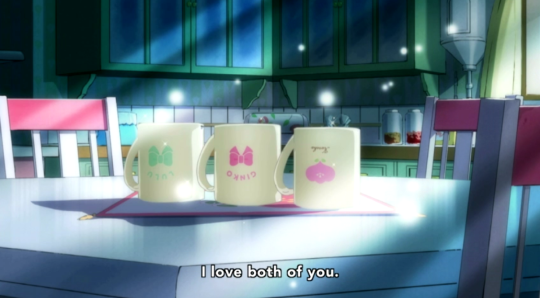
Oh, great. Two minutes in and I’m already a wreck. This episode is going to kill me.
As morning arrives, the Stormtroopers have captured and cuffed both Kureha and Ginko and are renewing their Exclusion Vows (I guess they had to wait till the next day so someone could bolt a plank to the side of the roof). They “search evil” once again, and while it sure looks like they’re planning to use the Cyborg Zombie Battery Lesbian Bear-charged cannon to take out Ginko, it turns out that Kureha is STILL the the local evil (being a traitor ‘n’ all). The girls intend to have her execute Ginko as her punishment.
But they have no choice to be horrible to you, Kureha—you betrayed them, and they must remain invisible.
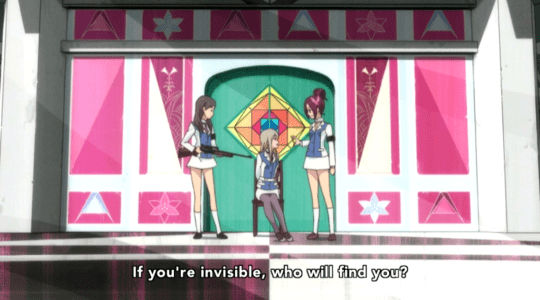
5-Minute Mark Chatter Time! …Actually, we’re gonna skip this one. It’s too early to go nuts on the analysis and I know my Afterthoughts are going to be monstrous, so while I could talk “invisible” for a couple paragraphs, it would mostly just boil down to “invisible=repressed, scared, and lonely in a crowd,” so let’s leave it at that and move on.
In an attempt to save Kureha from any more suffering, Ginko denies their friendship and swears she only crossed the wall to eat Kureha. But Kureha’s having none of it—she approaches Ginko, reminding her of what they’ve been through together and the love Ginko gave her, and at last names Ginko as her friend. Yet Ginko still denies it, revealing and openly acknowledging her true form:
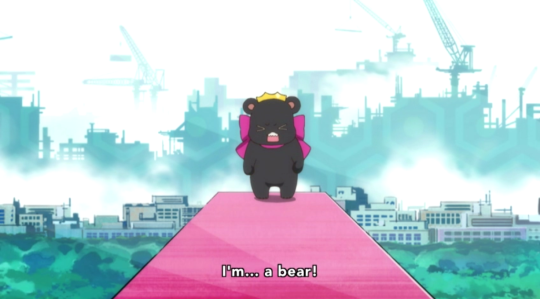
A bear! A bear! All black and brown and covered with hair!
As the Storm raise their guns and prepare to “exclude” Ginko, Kureha remembers the chanting mob from her childhood, and the rest of her memories come flooding back. She remembers the attack, and how afterwards she decided that, if Ginko wasn’t a bear anymore, than the two of them could be together. That’s right, folks—both Ginko AND Kureha went before the Severance Court seeking a Promise Kiss!
And now that Kureha’s got her memories back, the CourtBears are calling her back to the stand. As she walks the stairs (making her the first character not to tumble down them, I believe), she remembers her childhood trial, when she asked the Court to make her wish come true:
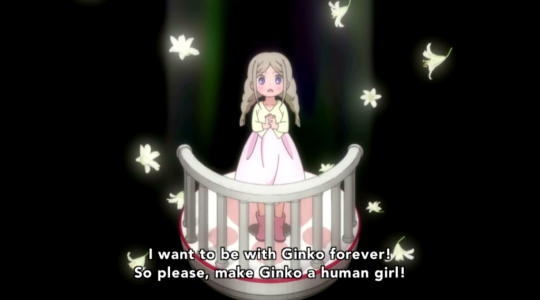
Sorta gives that old “But my love can change you!” misconception a whole new meaning, don’t it?
Cool calls this the sin of “pride” and Beauty points out that Kureha wants to “transform” Ginko. Kureha doesn’t see any other option, though—Ginko will be excluded otherwise, she says, and besides, being a human is TOTES better than being a bear, anyway. So the Court gives her what she wants in exchange for her love/memories of Ginko.
As present-day Kureha looks on, her mother’s star pendant clasped in her hands, she understands that this is a wish “no one should ever make,” and calls her childhood love “selfish.”
10-Minute Mark Chatter Time! Kureha was always the toughest character for me to get a handle on, partially because of the amnesia thing but also, I think, because she functioned like a lot of lead characters in romance stories do: as a kind of stand-in for the viewer/reader, making her personality more subdued so audience members could self-insert more easily.
Most of the time I’d call that a narrative weakness, but here I think it ends up mostly working, because (as I mentioned last week) it makes us accomplices in her misconceptions and forces us to reevaluate our worldviews along with her. So by the time we get to Kureha’s crime (a combo-attack of internalized prejudice and personal egotism), we’re halfway guilty of it as well; not only of “othering” the bears, but of seeing them as the lesser (or more vicious or dangerous or what have you) of the two groups.
And so, as her trial continues in the present day, Kureha admits her crime of pride. She remembers Sumika, who taught her “the thing she was searching for within the Invisible Storm,” which was:

(Honestly, I’m a little ashamed it took me this long to make that joke.)
As she lets go of Sumika and comes to understand what “real love” is, Kureha’s handcuffs come off (it’s symbolical!) and she renews her promise not to give up on love. So she leaps into the storm, crossing the distance between herself and Ginko. (Fortunately, Cybearg Konomi is on the fritz, so the Storm can’t do anything to prevent this.)
Kureha reaches Ginko just as that too-lovely-for-words version of “Ave Maria” begins playing, and returns the star pendant. Kureha calls out to Kumaria, which awakens the fractured goddess, and her fallen shards rise from the earth to come together again. This, it turns out, includes our three CourtBears.
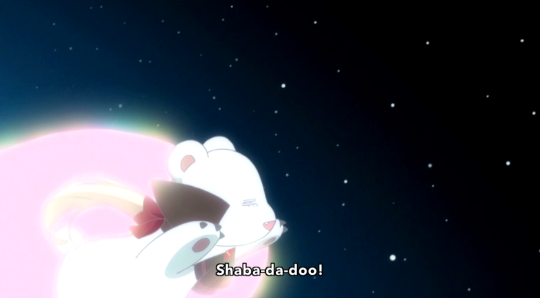
You sure shaba-da-did, buddy.
15-Minute Mark Chatter Time! Hey, you know what I was super wrong about? The CourtBears. I mean, there were times (like in Lulu’s story) where they definitely had a patriarchal “male romantic partner stereotypes” thing going on, but that wasn’t really their primary role. No, turns out they were fragments of Kumaria, working to carry out her will. Which does make sense, as love can certainly be sexy, cool, and/or beautiful. It’s also much more than that, and to suggest it’s only one of those things or even only all of those things (as many works of fiction do) is a gross oversimplification, parts instead of a whole, and therefore imperfect (as their verdicts and contracts are).
I’ll likely be mulling over these guys for a while, but what I think we should remember is that the characters who came before the Court (until this episode) were all trying to get a wish granted while also being guilty of a crime—possessiveness, self-denial, pride, etc.—and so those wishes came with costs. But today, Kureha comes to them knowing her past crime and wanting to atone for it. So when she makes her wish (and we’ll talk about that in the Afterthoughts, rest assured), she doesn’t have to make a half-baked contract with fragments of Kumaria, but can instead speak to Kumaria directly, and have her wish granted in full.
Also, for a worthwhile additional interpretation: While searching for animated gifs I stumbled across this Tumblr post, which points out the matching color schemes between our main trio and the CourtBears, and compares their driving forces (and, I’d argue, their weaknesses). But I’m way over my usual word count as-is, so I’ll let that conversation happen in the comments section.
The revived Kumaria, personification of love, comes before Kureha in the form of Sumika (or maybe it’s actually her—she has been wearing little flower/star shards all over her hair, after all—I’m not sure it really matters), and asks one last time: Is your love the real thing? Kureha says it is, and to prove it, she raises her gun and smashes the mirror of herself. And, as she does, she tells Kumaria her NEW wish: “Turn me into a bear.”
“Yuri approved,” says Kumaria all regal-like, and once again disperses into fragments, raining down as lily flowers upon the earth. But before she vanishes, she grants Kureha her wish.
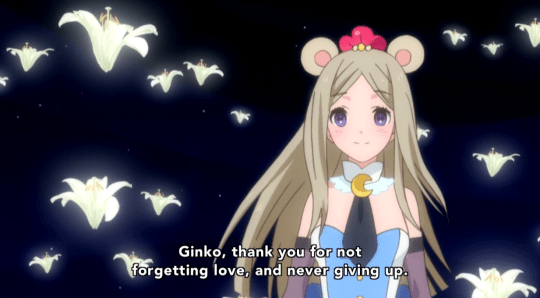
Kureha and Ginko at last share their Promise Kiss, and I tear up BOTH times I watch it happen. Then the two dance a happy little bear dance, because that, too, is an essential part of being in love.
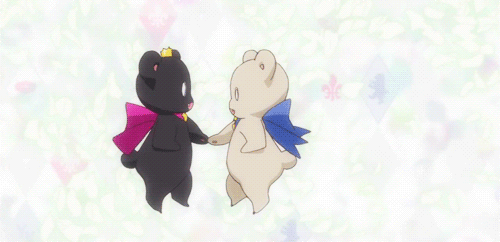
InvisibLeader Chouko is horrified, Cybearg Konomi and the lily-cannon operator are moved to tears, and the rest of the girls aren’t quite sure what to feel. At Chouko’s urging, the frightened Stormtroopers raise their guns and fire just as the stained glass behind them looks like it’s about to open, and..
…Cut to a short while later, as Chouko stands before the school assembly and congratulates them on a “Successful Exclusion.” But of course the cycle MUST begin again (how can you be an “us” if there’s no “them?”), so the girls hold their next Exclusion Ceremony. But the lily-cannon operator is having none of it, because she saw what really happened on the roof: how the Door to Friendship opened and our young couple escaped “beyond severance,” just as Reia’s book foretold.
So the girl walks out of the ceremony and heads to the lily garden, where the door has been barricaded and poor, lonely Cybearg Konomi has been tossed into a box, “Defective” and alone—but not for long.
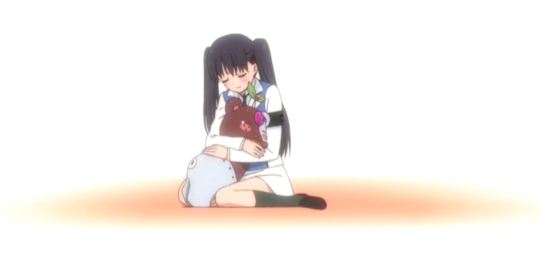
“Found you,” says the girl. And, as the opening theme begins, so too does another Yuri Bear Stor(m)y.
20(ish)-Minute Mark Chatter Time! I’ll be honest: As much as I loved Ginko and Kureha’s Promise Kiss, this scene between Konomi and Pigtails was hands-down the most moving moment of the episode for me—and not just because I finally (kinda) got my redemption arc for the Invisible Storm, either. It suggests a cycle rather than a single story, which, in turn, makes the inclusion of Reia and Yuriika’s failed romance a more natural part of the tale. More importantly, it shows that Kureha and Ginko were not the exception to the rule. Every girl at Arashigaoka Academy has the power to step away from the cycle of hatred and exclusion, and this moment proves it.
Pigtails “finds” Konomi because of Ginko and Kureha and the world she glimpsed through Kumaria’s doorway. No longer afraid, she chooses to cross the bearier, abandon the Storm, and become visible. Maybe Konomi and Pigtails will find real love, like Ginko and Kureha. Maybe they won’t, like Reia and Yuriika. The point is that, thanks to what happened on the roof, Pigtails now has the courage to at least try. And that in turn hints at the possibility of a ripple effect, which could lead to an entire systemic change—but we’ll talk more about that in the Afterthoughts, too.
Not content to end there, YKA continues to stuff my heart with happiness as the credits roll and we’re taken to “The Place Where Love Becomes Kisses,” where Lulu (LULU!) is reading the story of Ginko and Kureha’s journey to her baby brother Milne (MILNE!). Neither are quite sure what happened to the girls after they vanished (tacitly encouraging us at home to consider it, too), but Milne has figured out one thing: he could have given Lulu the Promise Kiss instead of waiting for her to give him one first. And so he does, and Lulu’s bee encircles them both.
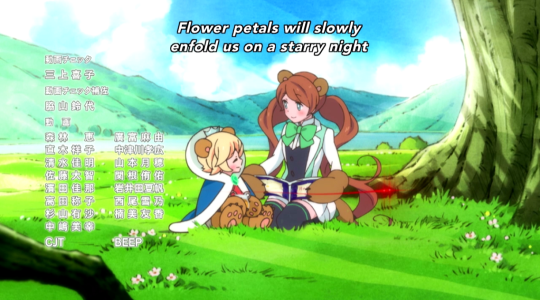
Bear Heaven is adorable, you guys. I’m going to be extra-good and clever so that I can go to Bear Heaven someday, too.
And meanwhile, far beyond severance, Ginko and Kureha are still happy together, not as bears nor humans but somehow both, and neither, no longer separated by pride or fear or dogmatic boundaries, but instead connected by understanding, compassion, and love.
And, since it’d be way rude to spy on them while they’re snogging, Ikuhara gives them some privacy as the scene dims, and our love bullet train comes to its final rest.
Afterthoughts
I’m going to resist the urge to fill this section with endless reaction gifs and gush about how much I adored that finale, because I already did that a whole bunch.
…Okay. ONE gif.
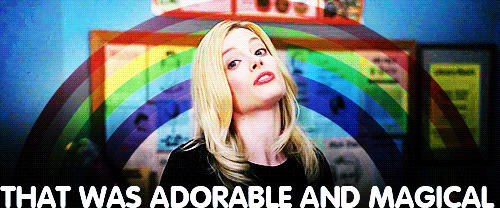
But that’s all!
Instead, I’m going to try to explain why I adored it, and I’m going to try to boil it down to two major topics: Kureha’s wish, and the promise of revolution. Yeah. It’s ‘bout to get essay-tastic up in here.
Yuri Approved!
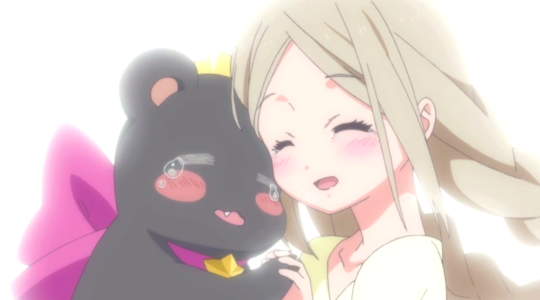
So, let’s talk about Kureha and Ginko. I love what YKA does with them this week, because up to this point we’ve really been viewing everything from a human (Kureha’s) perspective, and YKA calls that out. When Ginko saw how society treated their relationship, she tried to change herself; when Kureha saw it, she tried to change Ginko. It’s internalized prejudice at its finest (childishly justified with “well, I’m sure she’d be happier if she was like me, anyway”), and while we’ve seen Kureha moving back toward the idea of bears as friends these past few episodes, it’s not until she makes her wish to Kumaria that she acknowledges Ginko not only as something she loves, but as someone, equal and complete. And that, folks, is what YKA calls real love.
There’s a knee-jerk reaction to see Kureha’s wish as another Little Mermaid scenario (“change yourself for the person you love”) but in context I don’t think that’s the case. Kureha doesn’t do this for Ginko—Ginko already loves her and accepts her, after all—but for herself, to show that she’s ready to move away from her past prejudices and accept Ginko as she is, body and soul (and, if we want to expand this grand metaphor, culturally as well, maybe).
(As an aside, Gabriella (@gabbomatic) over at Anime News Network made some great points in her Episode 11 review about the connection between The Little Mermaid and Yurikuma. I was going to work it into this post but just didn’t have the time, but I did want to point it out and encourage you to give it a read.)
While I think one of YKA’s strengths is that it’s a story we can view in universal, person-to-person terms, there is a second, more specific level we really shouldn’t ignore, and it brings us back around to our earlier episode conversations about how lesbians are treated in (particularly Japanese) fiction, as either sex-crazed (or just plain crazed) predators or innocent (Class S) children. One way to look at YKA is as a metafictional (dammit, I hate that word, but I couldn’t NOT use it here) exploration of these two binaries, where the bears represent that sexual aggression/desire and the girls represent that emotional “purity.”
So, from this perspective, YKA is an attempt to show how actual relationships work and ought to be portrayed in fiction: that it’s more than just predatory aggression and “eating” (the impulse which Ginko has to overcome), but that we also can’t pretend sex and desire don’t exist, either. So when Kureha asks to become a bear, we can see it as her accepting her own homosexuality, at last admitting that her desires are physical as well as emotional.
What both these readings mean, in essence, is that Ginko and Kureha are acknowledging that there is more to love (and especially to lesbian relationships) then just this one thing or just that other thing: it’s a complicated combination of self and other, of emotional and physical.
The beauty of it is that Kumaria gets it, too. When she turns Ginko into a human and Kureha into a bear, she actually turns them into both—or maybe neither. Ginko was able to move between bear, human, and hybrid forms at will, and once Kureha makes her wish, she’s able to do the same. So by accepting one another (smashing the ego, the “self”), Ginko and Kureha tear down the boundaries between girls and bears, becoming something else entirely. In a world obsessed with walls and boxes, they no longer fit neatly into the category of either bear or human.
Which is precisely why they have to leave.
A World Beyond Severance
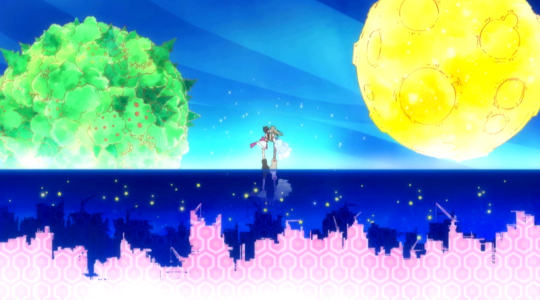
“Those who reject that place are, conversely, rejected by it as well. This is the nature of systems: The moment you reject them, you are forced to realize that they’re the very ground you’re standing on.”
—Kunihiko Ikuhara, Utena Episode Commentary: Part 2
(Translated by Sarah Alys Lindholm)
This quote is a perfect place to start, because it neatly summarizes Ikuhara’s stance on rejected systems and gives us a good entryway for my last bit of discussion (almost done, team!). It also pretty succinctly explains why Ginko and Kureha can’t stay in the world of severance since, as I mentioned above, they’ve gone beyond the boundaries that divide girls and bears. Our girls have utterly rejected the basic “rules” of the world where they live, and so they can no longer live there. Or, as another Ikuhara heroine once put it: “Let’s go to the outside world.”
Ikuhara understands social structures and change better than most, and while I know there’s something kinda frustrating about seeing a broken system live on (as the Exclusion Ceremony and presumably the Bear Church both do), the fact is, deeply entrenched beliefs do not disappear with the flash of Kumaria sparkles. It’s a long, slow process, and often isn’t about changing a broken system so much as recognizing it, rejecting it (preferably on a rooftop where lots of people are watching), and then moving out of it and into a healther one.
Which sounds kinda depressing, but Yurikuma Arashi (and all Ikuhara original works, I think) provides us with hope, albeit of the gradual kind, because it fervently believes in the power of passionate individuals to enact change, even if that change only occurs in a single other person. This is why Konomi and Pigtails’ moment is so incredibly important, because it shows that Ginko and Kureha left a mark on the school, and that it’s possible for other girls and bears to move beyond severance.
And, if each individual keeps affecting even just one other individual, then eventually there are more people “beyond severance” than there are within it—and maybe eventually, some day, there won’t be anyone within it at all. Kureha and Ginko can’t destroy the broken world of severance, where walls divide groups and invisible storms exclude anyone who stands out. But if they and others like them keep (as Utena would put it) living heroically, with style, then one day the people in that broken world may choose to abandon it altogether. So maybe Kureha and Ginko revolutionized the world a little bit after all.
And that’s all I got! Thanks for joining me on this wild and wonderful ride through the insane, silly, sad, and beautiful world of bears, lesbians, and lesbian bears. It’s been a trip I won’t soon forget, and I mean that in the best way possible.
Now, if you’ll excuse me, I need to go sleep for a week, so I’ll turn it over to you guys to mull over in the comments. But before I go, I’ll pose this riddle: What’s better than one bear dancing to the Yurikuma ending theme?
Answer: THREE bears dancing to the Yurikuma ending theme.
Dee (@JoseiNextDoor) is a writer, a translator, a book worm, and a basketball fan. She has bachelor’s degrees in English and East Asian studies and a master’s degree in Creative Writing. To pay the bills, she works as a technical writer. To not pay the bills, she writes young adult novels, watches far too much anime, and cheers very loudly for the Kansas Jayhawks. You can find her at The Josei Next Door, a friendly neighborhood anime blog for long-time fans and newbies alike.
Are you following The Mary Sue on Twitter, Facebook, Tumblr, Pinterest, & Google +?



